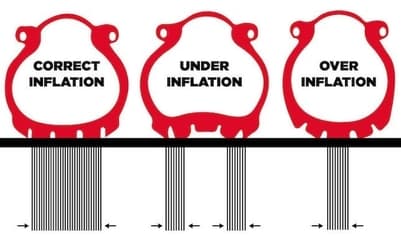What should my tyre pressure be?
Tyre pressures are a very important part of tyre maintenance and should be checked regularly, but do you know what your tyre pressure should be?

It is estimated that 50% of UK motorists are driving on under-inflated tyres and many don’t realise how this affects their road handling. Under-inflated tyres increase your risk of a tyre-related incident, increases fuel consumption and can cause rapid tyre wear.
All vehicles have recommended tyre pressures, which can usually be found in your handbook, in the door sill or inside your fuel cap.
If you can’t find the tyre pressures for your vehicle, we have an easy-to-use tyre pressure look-up system online, simply enter your registration number into the search box at https://www.national.co.uk/information/check-your-tyre-pressures
Please note, tyre pressures will need to be adjusted if your vehicle is fully laden.
Related: Tyre Maintenance
How to check tyre pressures
If you have a tyre pressure gauge you can check your tyre pressures at home, simply remove your valve cap, fix the tyre pressure gauge onto the tyre valve and the tyre pressure reading should appear on the gauge. If you need to add more air, either do this with a foot pump or at your local petrol station.
If you have a tyre air compressor you can check your tyre pressures in the same way as a tyre pressure gauge, but the advantage of an air compressor is that you can add air very easily by plugging the compressor into a charging point in your vehicle and simply switch it on until you reach the correct air pressure.
Most petrol stations have tyre pressure stations, so you could check your tyre pressures after filling up. There is usually a charge for this service, but it doesn’t normally cost a lot of money.
We also offer FREE tyre pressure checks in all our National Tyres and Autocare branches.
Be careful not to over-inflate your tyres, as this can be dangerous too.
Can you drive with low tyre pressure?
It is not advisable to drive with low tyre pressures, as this can affect your road handling, making steering more difficult round corners, your tyres can overheat due to increased road friction and can increase your risk of a tyre blow-out or tyre related road accident.
Driving on low tyre pressures can also cause rapid tyre wear, usually on the outside edges which can have an impact on your braking performance and also increase fuel consumption.
Please don’t ignore tyre pressure warning lights on your dashboard.
Related: Dashboard Warning Lights
Can you check your tyre pressure online?
You can check recommended tyre pressure for your vehicle online at https://www.national.co.uk/information/check-your-tyre-pressures
How to inflate car tyres at home
We would recommend that you purchase a tyre air compressor, it is really easy to use and has a digital tyre pressure reading. If you need to add more air, plug the air compressor into a charging point in your car and simply switch it on until you reach the correct air pressure.
How do you know how much air to put in your tyres?
All vehicles have recommended tyre pressures for a normal load, which can usually be found in your handbook, in the door sill or inside your fuel cap.
When your vehicle has a full load, your tyre pressures will need to be adjusted, but don’t forget to adjust these back again when you return to a normal load.
How do I pump up my tyres?
You can add air to tyres quickly by using a tyre air compressor, these can be purchased online or at your local motoring supplies shop.
Most petrol stations have tyre pressure stations, so you could check your tyre pressures and add air after filling up. There is usually a charge for this service, but it doesn’t normally cost a lot of money.
All our National Tyres and Autocare branches can pump up your tyres for FREE.
Related: Tyre Pressures
If you need more advice on tyre pressures please speak to a tyre technician in one of our branches.
Did you enjoy this blog post? |


 Sign up for SPECIAL OFFERS
Sign up for SPECIAL OFFERS
